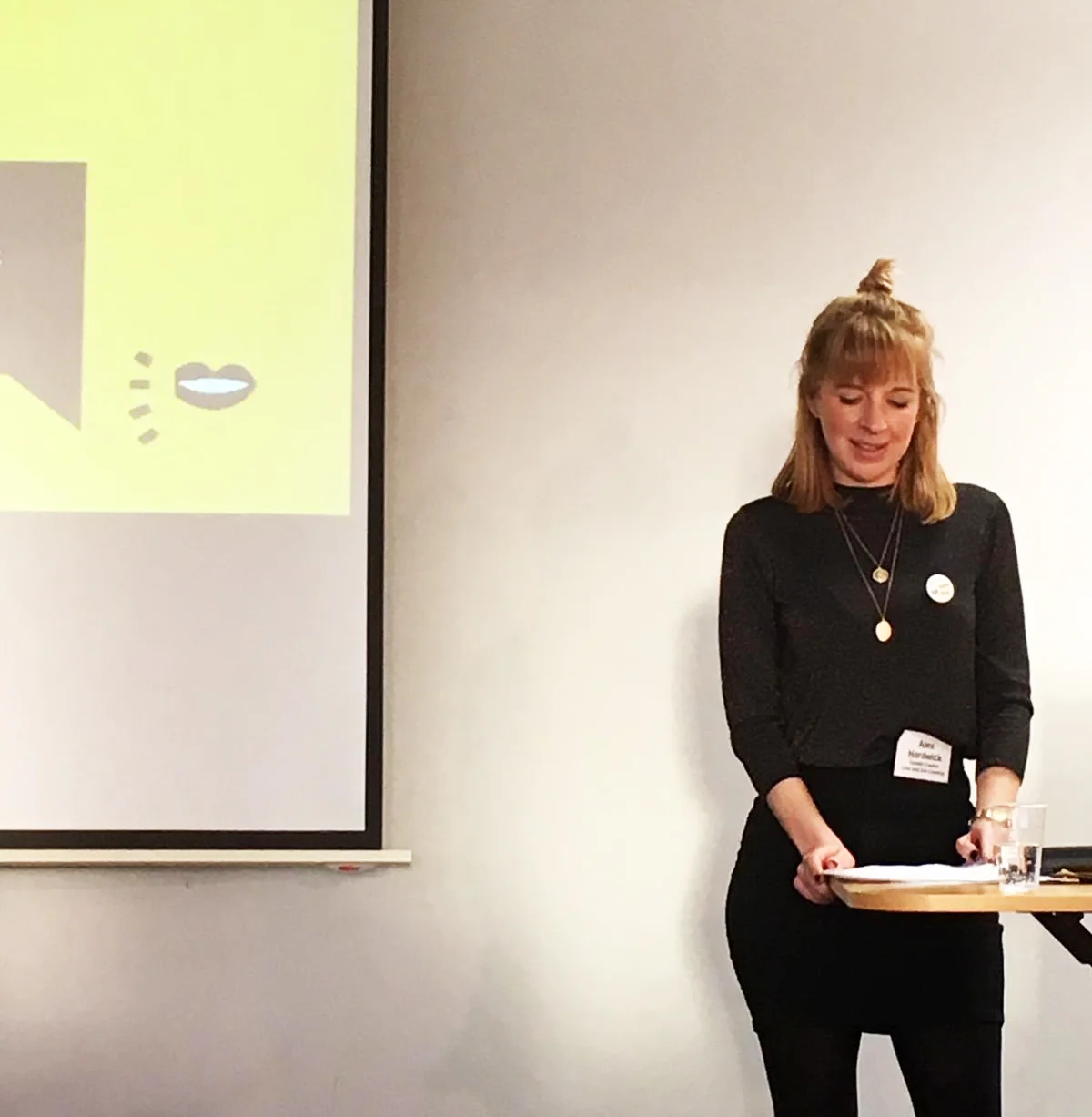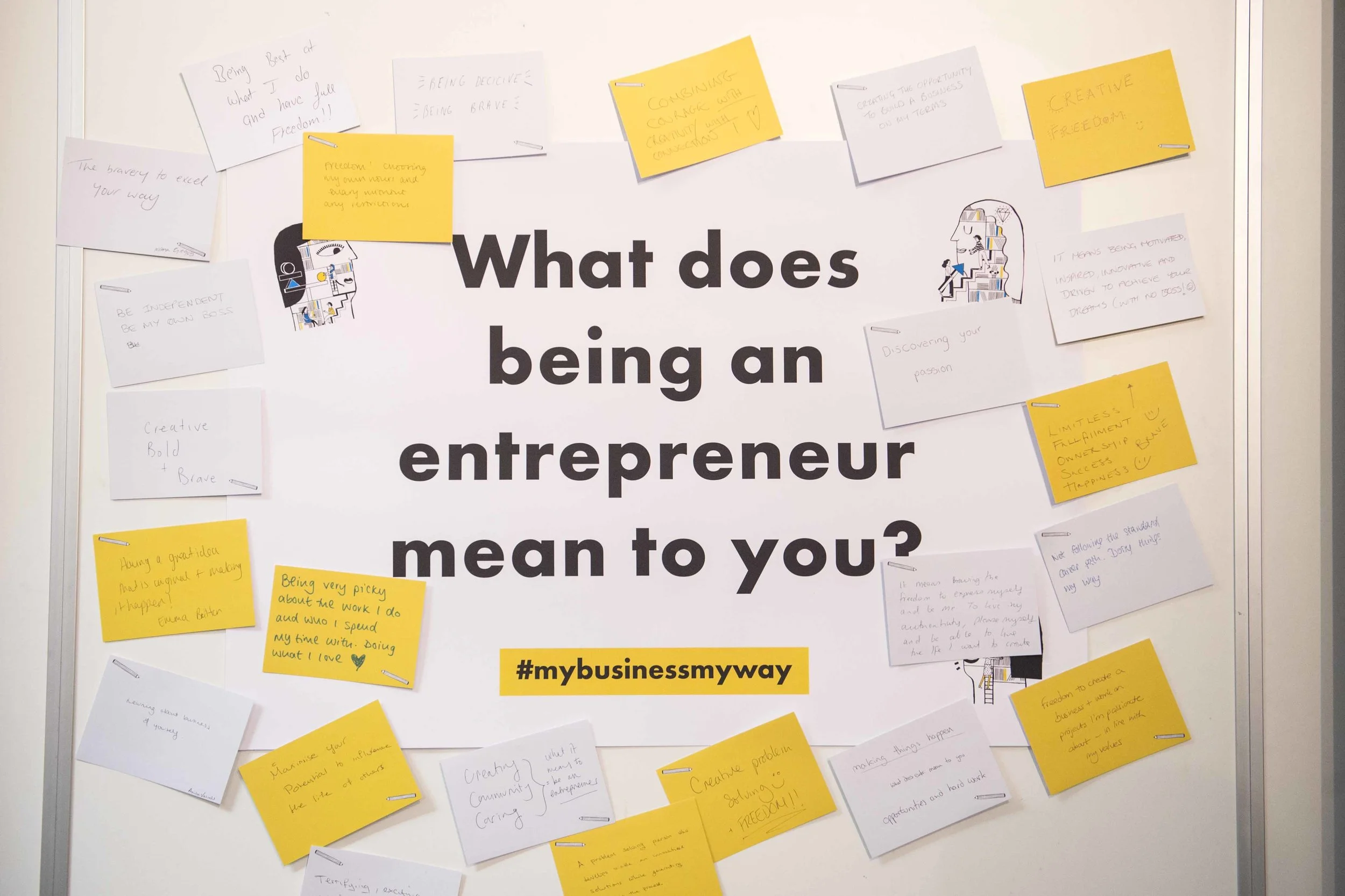My business my way
In 2015, Dr Isobel O’Neil of the University of Nottingham started to explore how female business founders engage in an effort to both feel and seem legitimate as successful entrepreneurs. In the past, this type of research has been biased towards a more masculinised ‘rules of the game’ approach and largely supported strategies that displayed these norms.
Isobel’s research findings highlighted that female entrepreneurs have built their own ‘rules of the game,’ and find legitimacy in very different ways. The main thing: women have different visions of success. Success isn’t defined by winning the biggest clients or how much money is in the bank. Instead, there is a sound ethic around finding their entrepreneurial identities, nurturing strong, collaborative relationships and anchoring their success to a personalised set of values.
Sample pages from the toolkit
Who
A line-up of passionate female entrepreneurs, with their own inspiring journeys made up the project team who developed the toolkit. All-female participants were also involved to draw from their experiences (the good and the bad). Overall, it was important for the group of people who were behind the toolkit to have a plethora of experience, from working with small start-ups, SMEs, charities, social enterprises, local authorities, Higher Education through to FTSE 100 companies.
Alexandra Hardwick (pictured), owner of creative agency Line and Dot Creative was part of this project team. Her many years of working as a graphic designer made her a key player when it came to developing the interactive exercises, the flow of the pages and critically, the overall design and feel of the toolkit. She quotes ‘throughout the project, I always had at the front of my mind an entrepreneur’s most limited resource – time. I wanted the toolkit to be easily accessible to everyone, not too copy heavy and with interactive questions and prompts to guide the entrepreneur. I picked yellow as the key colour to represent positivity, clarity, energy and optimism, and we captured the diversity and essence of the modern business woman by using photographs of real female entrepreneurs from the focus groups.’
Fellow business owners Debbie Clark and Sarah King also worked on the toolkit drawing upon their extensive coaching and business experience to strengthen the relevance of the exercises and the quality of the copy throughout the process.
The Research
What does the word ‘entrepreneur’ mean to you? If you look it up in the Oxford English dictionary, it’s described as ‘a person who sets up a business or businesses, taking on financial risks in the hope of profit.’ For many who tune in to prime time TV, this paints an image of an Apprentice-style, profit-hungry young male. Google image the word and that’s exactly what most of the pictures show – young men in suits.
Yet in 2016, an estimated 111 million women were running established businesses, and 163 million women were starting or running new businesses across 74 economies around the world. Women have huge entrepreneurial potential, however, it’s often the case that men are significantly more confident, self-assured and have riskier decision making styles than their female counterparts. This has left women entrepreneurs being generally perceived as less successful and sometimes locking them out of opportunities.
In 2015, Dr Isobel O’Neil of the University of Nottingham started to explore how female business founders engage in an effort to both feel and seem legitimate as successful entrepreneurs. In the past, this type of research has been biased towards a more masculinised ‘rules of the game’ approach and largely supported strategies that displayed these norms.
Isobel’s research findings highlighted that female entrepreneurs have built their own ‘rules of the game,’ and find legitimacy in very different ways. The main thing: women have different visions of success. Success isn’t defined by winning the biggest clients or how much money is in the bank. Instead, there is a sound ethic around finding their entrepreneurial identities, nurturing strong, collaborative relationships and anchoring their success to a personalised set of values.
The Toolkit
In 2018, a project team led by Isobel used this new found insight to develop an inspiring and practical toolkit for female entrepreneurs, called ‘My Business My Way.’ The motivation behind the toolkit development was to boost confidence in decision making processes and to instigate conversation, collaboration and a sense of community for female entrepreneurs. Overall, the toolkit has been created to support and empower women to own their space in the entrepreneurial landscape. This, the team feel is important for moving away from the idea of having to perform to the masculinised ‘rules of the game,’ which when you scratch at the surface, suggests a dated way of being an entrepreneur.
Who
A line-up of passionate female entrepreneurs, with their own inspiring journeys made up the project team who developed the toolkit. All-female participants were also involved to draw from their experiences (the good and the bad). Overall, it was important for the group of people who were behind the toolkit to have a plethora of experience, from working with small start-ups, SMEs, charities, social enterprises, local authorities, Higher Education through to FTSE 100 companies.
Alexandra Hardwick, owner of creative agency Line and Dot Creative was part of this project team. Her many years of working as a graphic designer made her a key player when it came to developing the interactive exercises, the flow of the pages and critically, the overall design and feel of the toolkit. She quotes ‘throughout the project, I always had at the front of my mind an entrepreneur’s most limited resource – time. I wanted the toolkit to be easily accessible to everyone, not too copy heavy and with interactive questions and prompts to guide the entrepreneur. I picked yellow as the key colour to represent positivity, clarity, energy and optimism, and we captured the diversity and essence of the modern business woman by using photographs of real female entrepreneurs from the focus groups.’
Fellow business owners Debbie Clark and Sarah King also worked on the toolkit drawing upon their extensive coaching and business experience to strengthen the relevance of the exercises and the quality of the copy throughout the process.
How + what
The toolkit needed to be relevant to the modern day female entrepreneur, and so a series of focus groups were hosted with a wide range of women and business owners from the local community. During these collaborative events participants discussed why, how and what would make the toolkit content relevant, which was essential feedback to help the project team to better appreciate female entrepreneurs’ needs. This meant the toolkit was built with them in mind, focusing on encouraging the reader through critical stages of their business journey.
The feedback also helped to shape the flow and visuals- the toolkit is an editable and interactive PDF split into three sections; My Self, My People and My Success. Each section has been designed so the reader can better appreciate their place within the business world, to reflect on and evaluate their journey so far, find the right people to collaborate with and work out their own definitions of success as female entrepreneurs. The suite of tools can be used, edited and monitored again and again. For example, ‘My Achievements’ can be used weekly (if not daily!), the ‘My Audiences’ tool can be filled in for each of various key audiences and ‘My Vision and Goals’ can be revisited over and over as a business evolves.
Ultimately, the team want women to reclaim the word ‘entrepreneur’, and remove the fear of what it traditionally means to become a successful one. Money in the bank is only one of many ways to define it: ‘being focused and having a vision; for how I want to work, what I want to achieve and how I’m going to get there’ is a more common mantra.
Ultimately, there isn’t a right way to build a business, be an entrepreneur or define success. There is onlyyour way.
If you’d like to see the toolkit, or find out more and spread the word to female entrepreneurs you may know, follow the link http://nottingham.ac.uk/go/mybusinessmyway












